8/9/2015, 11:16:30 PM · by 2ndDivisionVet · 31 replies
The National Post ^ | August 9, 2015 | George Jonas
RIP to 2DV.
Posted on 08/06/2023 7:01:59 PM PDT by SeekAndFind
The anniversaries of the atomic bombings of Hiroshima and Nagasaki present an opportunity to demolish a cornerstone myth of American history — that those twin acts of mass civilian slaughter were necessary to bring about Japan’s surrender, and spare a half-million US soldiers who’d have otherwise died in a military conquest of the empire’s home islands.
Those who attack this mythology are often reflexively dismissed as unpatriotic, ill-informed or both. However, the most compelling witnesses against the conventional wisdom were patriots with a unique grasp on the state of affairs in August 1945 — America’s senior military leaders of World War II.
Let’s first hear what they had to say, and then examine key facts that led them to their little-publicized convictions:
General Dwight Eisenhower on learning of the planned bombings: “I had been conscious of a feeling of depression and voiced to [Secretary of War Stimson] my grave misgivings, first on the basis of my belief that Japan was already defeated and that dropping the bomb was completely unnecessary, and secondly because I thought that our country should avoid shocking world opinion by the use of a weapon whose employment was, I thought, no longer mandatory as a measure to save American lives. It was my belief that Japan was, at that very moment, seeking some way to surrender with a minimum loss of ‘face’.”
Admiral William Leahy, Truman's Chief of Staff: “The use of this barbarous weapon…was of no material assistance in our war against Japan. The Japanese were already defeated and ready to surrender because of the effective sea blockade and the successful bombing with conventional weapons.”
Major General Curtis LeMay, 21st Bomber Command: “The war would have been over in two weeks without the Russians entering and without the atomic bomb…The atomic bomb had nothing to do with the end of the war at all.”
General Hap Arnold, US Army Air Forces: “The Japanese position was hopeless even before the first atomic bomb fell, because the Japanese had lost control of their own air.” “It always appeared to us that, atomic bomb or no atomic bomb, the Japanese were already on the verge of collapse.”
Ralph Bird, Under Secretary of the Navy: “The Japanese were ready for peace, and they already had approached the Russians and the Swiss…In my opinion, the Japanese war was really won before we ever used the atom bomb.”
Brigadier General Carter Clarke, military intelligence officer who prepared summaries of intercepted cables for Truman: “When we didn’t need to do it, and we knew we didn’t need to do it…we used [Hiroshima and Nagasaki] as an experiment for two atomic bombs. Many other high-level military officers concurred.”
Fleet Admiral Chester Nimitz, Pacific Fleet commander: “The use of atomic bombs at Hiroshima and Nagasaki was of no material assistance in our war against Japan. The Japanese were already defeated and ready to surrender.”
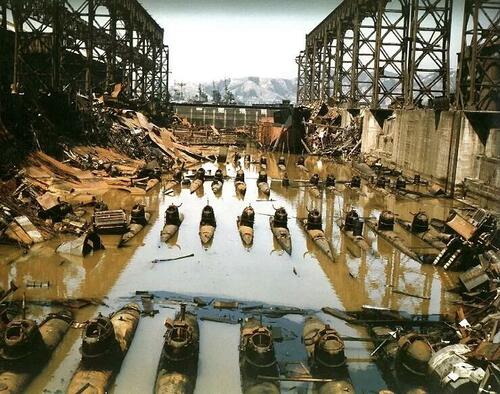
Putting out feelers through third-party diplomatic channels, the Japanese were seeking to end the war weeks before the atomic bombings on August 6 and 9, 1945. Japan’s navy and air forces were decimated, and its homeland subjected to a sea blockade and allied bombing carried out against little resistance.
The Americans knew of Japan’s intent to surrender, having intercepted a July 12 cable from Japanese Foreign Minister Shigenori Togo, informing Japanese ambassador to Russia Naotake Sato that “we are now secretly giving consideration to the termination of the war because of the pressing situation which confronts Japan both at home and abroad.”
Togo told Sato to “sound [Russian diplomat Vyacheslav Molotov] out on the extent to which it is possible to make use of Russia in ending the war.” Togo initially told Sato to obscure Japan’s interest in using Russia to end the war, but just hours later, he withdrew that instruction, saying it would be “suitable to make clear to the Russians our general attitude on ending the war”— to include Japan’s having “absolutely no idea of annexing or holding the territories which she occupied during the war.”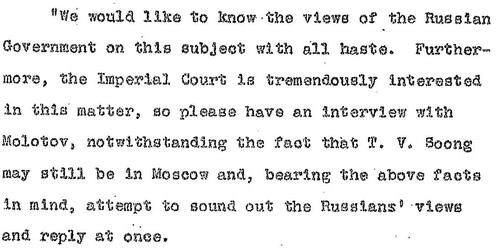
An excerpt from a July 12, 1945 US War Department summary of an intercepted cable from Japanese Foreign Minister Shigenori Togo to his ambassador to Russia
Japan’s central concern was the retention of its emperor, Hirohito, who was considered a demigod. Even knowing this — and with many US officials feeling the retention of the emperor could help Japanese society through its postwar transition —the Truman administration continued issuing demands for unconditional surrender, offering no assurance that the emperor would be spared humiliation or worse.
In a July 2 memorandum, Secretary of War Henry Stimson drafted a terms-of-surrender proclamation to be issued at the conclusion of that month’s Potsdam Conference. He advised Truman that, “if…we should add that we do not exclude a constitutional monarchy under her present dynasty, it would substantially add to the chances of acceptance.”
Truman and Secretary of State James Byrnes, however, continued rejecting recommendations to give assurances about the emperor. The final Potsdam Declaration, issued July 26, omitted Stimson’s recommended language, sternly declaring, “Following are our terms. We will not deviate from them.”
One of those terms could reasonably be interpreted as jeopardizing the emperor: “There must be eliminated for all time the authority and influence of those who have deceived and misled the people of Japan into embarking on world conquest.”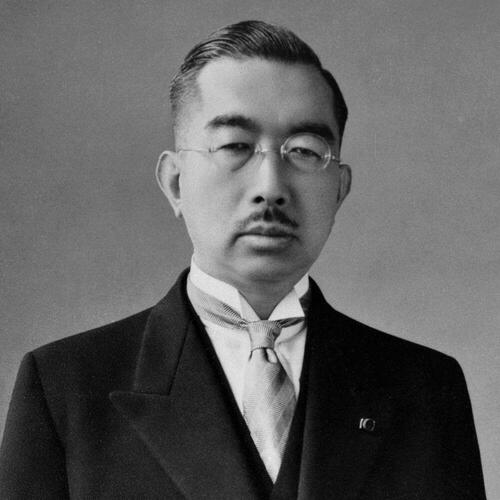
Japanese emperor Hirohito reigned from 1926 to 1989
At the same time the United States was preparing to deploy its formidable new weapons, the Soviet Union was moving armies from the European front to northeast Asia.
In May, Stalin told the US ambassador that Soviet forces should be positioned to attack the Japanese in Manchuria by August 8. In July, Truman predicted the impact of the Soviets opening a new front. In a diary entry made during the Potsdam Conference, he wrote that Stalin assured him “he’ll be in the Jap War on August 15th. Fini Japs when that comes about.”
Right on Stalin’s original schedule, the Soviet Union declared war on Japan two days after the August 6 bombing of Hiroshima. That same day — August 8 — Emperor Hirohito told the country’s civilian leaders that he still wanted to pursue a negotiated surrender that would preserve his reign.
On August 9, Soviet attacks commenced on three fronts. News of Stalin’s invasion of Manchuria prompted Hirohito to call a new meeting to discuss surrender — at 10 am, one hour before the strike on Nagasaki. The final surrender decision came on August 10.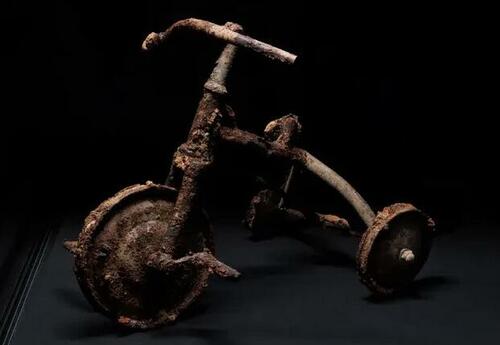
Three-year old Shinichi Tetsutani, burned as he was riding this tricycle when the atomic bomb hit Hiroshima, died a painful death that night (Hiroki Kobayashi/National Geographic)
The Soviet timeline makes the atomic bombings all the more troubling: One would think a US government that’s appropriately hesitant to incinerate and irradiate hundreds of thousands of civilians would want to first see how a Soviet declaration of war affected Japan’s calculus.
As it turns out, the Japanese surrender indeed appears to have been prompted by the Soviet entry into the war on Japan — not by the atomic bombs. “The Japanese leadership never had photo or video evidence of the atomic blast and considered the destruction of Hiroshima to be similar to the dozens of conventional strikes Japan had already suffered,” wrote Josiah Lippincott at The American Conservative.
Sadly, the evidence points to a US government determined to drop atomic bombs on Japanese cities as an end in itself, to such an extent that it not only ignored Japan’s interest in surrender, but worked to ensure that surrender was delayed until after upwards of 210,000 people — disproportionately women, children and elderly — were killed in the two cities.
Make no mistake: This was a deliberate targeting of civilian populations. Hiroshima and Nagasaki were chosen because they were pristine, and could thus fully showcase the bombs’ power. Hiroshima was home to a small military headquarters, but the fact that both cities had gone untouched by a strategic bombing campaign that began 14 months earlier certifies their military and industrial insignificance.
“The Japanese were ready to surrender and it wasn’t necessary to hit them with that awful thing,” Eisenhower would later say. “I hated to see our country be the first to use such a weapon.”
According to his pilot, General Douglas MacArthur, commander of US Army Forces Pacific, was “appalled and depressed by this Frankenstein monster.”
“When I asked General MacArthur about the decision to drop the bomb,” wrote journalist Norman Cousins, “I was surprised to learn he had not even been consulted…He saw no military justification for the dropping of the bomb. The war might have ended weeks earlier, he said, if the United States had agreed, as it later did anyway, to the retention of the institution of the emperor.”
What then, was the purpose of devastating Hiroshima and Nagasaki with atomic bombs?
A key insight comes from Manhattan Project physicist Leo Szilard. In 1945, Szilard organized a petition, signed by 70 Manhattan Project scientists, urging Truman not to use atomic bombs against Japan without first giving the country a chance to surrender, on terms that were made public.
In May 1945, Szilard met with Secretary of State Byrnes to urge atomic restraint. Byrnes wasn’t receptive to the plea. Szilard — the scientist who’d drafted the pivotal 1939 letter from Albert Einstein urging FDR to develop an atomic bomb — recounted:
"[Byrnes] was concerned about Russia's postwar behavior. Russian troops had moved into Hungary and Rumania, and Byrnes thought it would be very difficult to persuade Russia to withdraw her troops from these countries, that Russia might be more manageable if impressed by American military might, and that a demonstration of the bomb might impress Russia."
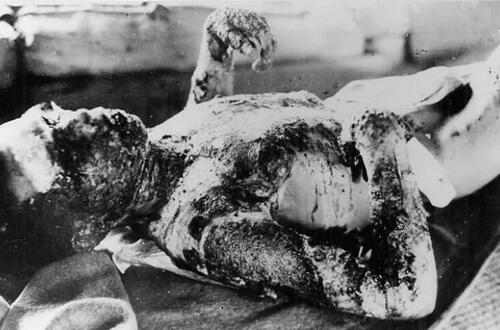
Whether the atomic bomb’s audience was in Tokyo or Moscow, some in the military establishment championed alternative ways to demonstrate its power.
Lewis Strauss, Special Assistant to the Navy Secretary, said he proposed “that the weapon should be demonstrated over… a large forest of cryptomeria trees not far from Tokyo. The cryptomeria tree is the Japanese version of our redwood… [It] would lay the trees out in windrows from the center of the explosion in all directions as though they were matchsticks, and, of course, set them afire in the center. It seemed to me that a demonstration of this sort would prove to the Japanese that we could destroy any of their cities at will.”
Strauss said Navy Secretary Forrestal “agreed wholeheartedly,” but Truman ultimately decided an optimal demonstration required burning hundreds of thousands of noncombatants and laying waste to their cities. The buck stops there.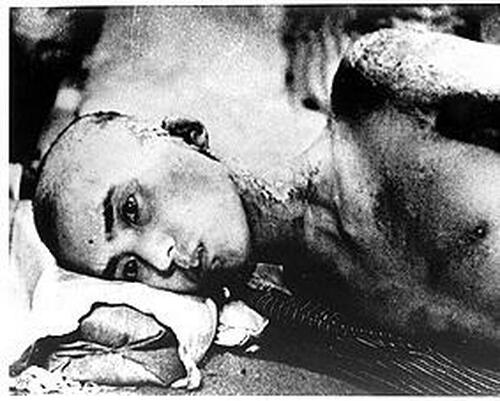
A victim of the atomic bomb
The particular means of inflicting these mass murders — a solitary object dropped from a plane at 31,000 feet — helps warp Americans’ evaluation of its morality. Using an analogy, historian Robert Raico cultivates ethical clarity:
“Suppose that, when we invaded Germany in early 1945, our leaders had believed that executing all the inhabitants of Aachen, or Trier, or some other Rhineland city would finally break the will of the Germans and lead them to surrender. In this way, the war might have ended quickly, saving the lives of many Allied soldiers. Would that then have justified shooting tens of thousands of German civilians, including women and children?”
The claim that dropping the atomic bombs saved a half-million American lives is more than just empty: Truman’s stubborn refusal to provide advance assurances about the retention of Japan’s emperor arguably cost American lives.
That’s true not only of a war against Japan that lasted longer than it needed to, but also of a Korean War precipitated by the US-invited Soviet invasion of Japanese-held territory in northeast Asia. More than 36,000 US service members died in the Korean War — among a staggering 2.5 million total military and civilian dead on both sides of the 38th Parallel.
We like to think of our system as one in which the supremacy of civilian leaders acts as a rational, moderating force on military decisions. The needless atomic bombing of Hiroshima and Nagasaki — against the wishes of World War II’s most revered military leaders — tells us otherwise.
Sadly, the destructive effects of the Hiroshima myth aren’t confined to Americans’ understanding of events in August 1945. “There are hints and notes of the Hiroshima myth that persist all through modern times,” State Department whistleblower and author Peter Van Buren said on The Scott Horton Show.
The Hiroshima myth fosters a depraved indifference to civilian casualties associated with US actions abroad, whether it’s women and children slaughtered in a drone strike in Afghanistan, hundreds of thousands dead in an unwarranted invasion of Iraq, or a baby who dies for lack of imported medicine in US-sanctioned Iran.
Ultimately, to embrace the Hiroshima myth is to embrace a truly sinister principle: That, in the correct circumstances, it’s right for governments to intentionally harm innocent civilians. Whether the harm is inflicted by bombs or sanctions, it’s a philosophy that mirrors the morality of al Qaeda.
That’s not the only thread connecting 1945 to 2023, as Truman’s insistence on unconditional surrender is echoed by the Biden administration’s utter disinterest in pursuing a negotiated peace in Ukraine.
Today, confronting an adversary with 6,000 nuclear warheads — each a thousand times more powerful than the bombs dropped on Japan — Biden’s own stubborn perpetuation of war puts us all at risk of sharing the fate of Hiroshima and Nagasaki’s innocents.
Same here. Who knows if they would have surrendered. My fathers PBY squadron had orders to deploy to Okinawa in preparation for the Invasion of Japan.
Why dropping the bomb 70 years ago was necessary, and why we need to be ready to do it again
Not a history buff, but it appears teaching the Chinese hordes a lesson my have been a good thing. Yet here we are and history plays out. No good deed goes unpunished
I, too, would likely never have been born were it not for the Nagasaki bombing. My dad’s POW camp, Fukuoka 17, was just across the bay from that explosion. As the prisoners looked up to see the plume, they imagined the biggest Japanese ammo dump that ever existed had just gotten hit.
It was in the first few days of 1946 that my dad appeared on his parents doorstep (unannounced). At first, they did not recognize the sickly, 44kg frame before them. That was even after a Thanksgiving and five months of having been restored to a reasonable diet, mostly on the Philippines.
If he had had to endure a few more months in the POW camp, he thought it likely he would not have come out alive.
Fully aware of the atomic bomb's destructiveness, Japan also knew that our bomb production capacity was limited and planned on resistance based on deep tunnels and heavily armed forces in reserve. Japan aimed to impose such massive casualties on US invasion forces that a peace would be agreed to on Japanese terms.
The core Japanese terms were the maintenance of the Emperor and the imperial system with no reckoning as to his participation in the war and immense financial benefit from war crimes throughout Asia. Yet, even with that agreed to and Hirohito ready to announce Japan's surrender, the Japanese military attempted a coup to depose him and continue fighting.
As quoted, many US military and civilian leaders correctly saw Japan as defeated but had little understanding of the Japanese warrior code and their military's willingness to continue fighting to the death of themselves and of Japan itself. If not for the use of atomic bombs, the Japanese would have had to be subdued through an extraordinarily destructive invasion.
As it was, the use of atomic bombs on Japan provided a psychological means by which the Japanese could reconcile themselves to defeat. This was anticipated and planned on by Hirohito and his circle.
As US intelligence decrypts revealed, after surrender, Japan began a calculated effort to generate international sympathy by claiming that the A-bomb was a uniquely evil weapon and that Japan was a victim. In effect, critics of the US bombing of Japan are carrying out old Japanese and Soviet propaganda themes against the US.
In the early 1980s I was stationed at our U.S. Navy Base in Sasebo, Japan — a city that was heavily hit with firebombs toward the end of the war — and is merely a 1.5 hour drive to Nagasaki city where the second bomb was dropped.
I befriended a guy by the name of Benny Toda, a 40ish heavy set guy who was competent and smart, though a misfit in Japanese society. He spent a couple years in America and he worked in his family’s business at a pre-Home Depot era hardware store.
He hated his job and told people what he really thought so he was not well-liked by the Japanese people who expected greater adherence to politeness.
But I struck up a little friendship with Toda-san. And he was a very funny guy. He spoke enough English that I was entertained and learned a lot from him.
When it came to discussing World War II one time, he flat out told me: “If you’re going to conquered by a foreign nation, it’s best to get beat by the Americans!”
In terms of lost lives, there were plenty of other bombings in World War 2 that were more costly than the bombs dropped in Hiroshima and Nagasaki.
The firebombing of Tokyo was one of those.
So I think the shock effect of the devastation just one bomb could do is what shook the Emperor and other military leaders to surrender.
Truman was a democrat partisan hack IMO in domestic affairs, but I’ll never hold the bombing of Hiroshima and Nagasaki against him.
I had three great uncles who fought those homicidal, suicidal, nihilistic nutjobs all over the Pacific, plus my paternal grandfather was on his way there after the defeat of Germany. Everyone of them, plus their family members were glad the war was over.
The bombing worked, it ended the war, which led to peace and eventually led to our current relationship with Japan.
I doubt them also. Especially after Okinawa and Iwo Jima. Japan’s military was actively training women and children to fight to the last one if we invaded them.
the United States had sustained over 49,000 casualties including more than 12,500 men killed or missing. Okinawans caught in the fighting suffered greatly, with an estimate as high as 150,000 civilians killed. Of the Japanese defending the island, an estimated 110,000 died.
Keywords here are 'undermines' and 'deeply unorthodox policy arguments and excavations.'
They are literally admitting they thrive on creating contrary argument and throwing up 'excavations' to support their 'arguments.' My only guess is that they are willingly creating the controversies in order to increase their media footprint and thus, their bottom line.
Bullcrap they were useless. Dont care, I’ve read enough on the subject and talked to enough people who were there. It wasn’t useless. It was dam necessary.
Hirohito’s top officers wanted to keep fighting after the 2 bombs.
Only the Emperor finally deciding not to, had these top men stand down.
To 7 My father-in-law was recovering from his third set of wounds on Iwo and preparing for the invasion of the Japanese mainland.
He told me that he knew he wouldn’t survive it.
My father was a standby ship out status to help supervise chemical weapons readiness in Australia if the Japanese used poison gas (which they had, especially in cyanide grenades, some of which were captured on the Pacific islands - I read the about them in military After Action Reports).
One of my older friends was on a medical ship heading towards Japan when the A Bombs were dropped. The ship turned around and headed back to Pearl Harbor.
A number of fathers of my friends survived Iwo. Some would not have survived the invasion of Japan, and would have deprived America of the next generation of patriotic Americans.
We are still here fighting against our leftist enemies on the Homeland, carrying on what our fathers, relatives and friends did in WW2. Otherwise we would be “Living in the United Soviet States of America”.
MM - S. Vietnam/Cambodia war journalist, on our side. Son-in-law, Kosovo and Desert Storm (combat wounded) and my son, Operation Iraqi Freedom and US Federal Police Officer.
48. The Japanese military refused to believe that one bomb could destroy a city. The next one made believers of them. End of war !!!
Except that it took TWO bombs to convince Japan to surrender and even that barely did the job. The vote to surrender passed by only ONE vote.
If that’s what it took to get them to surrender, then nothing short of annihilation through a long bloody war would have worked.
I heard they were chosen because of they were strategic militarily.
The “bomb” was Made in America, tested in Japan.
Food for thought.........
Disclaimer: Opinions posted on Free Republic are those of the individual posters and do not necessarily represent the opinion of Free Republic or its management. All materials posted herein are protected by copyright law and the exemption for fair use of copyrighted works.